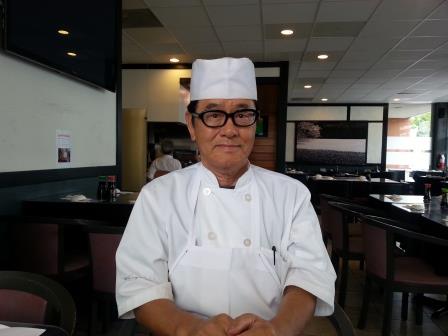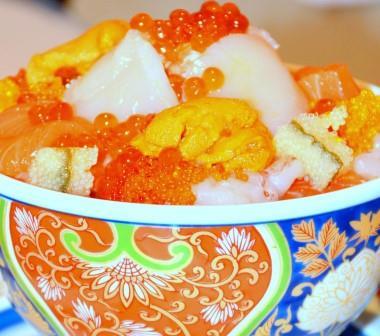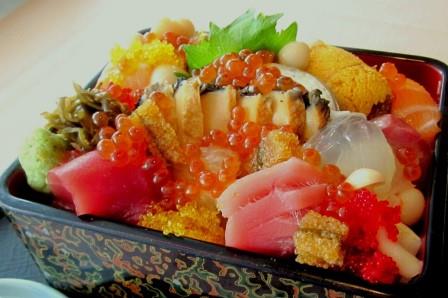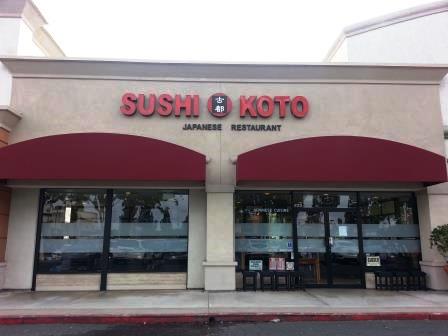



By Keiko Fukuda
I still remember that I almost always ended up choosing “Koto” near the airport for the place to have lunch when I was in Orange County. This Koto has moved from the old location near John Wayne Airport to Fountain Valley now, and is still doing well under the operation of the owner/ chef Yasuo Matsuki who used to be in charge of the old Koto.
The original Koto was operated by a Japanese sushi restaurant “Tsukiji Tama Sushi”. Mr. Matsuki was assigned to run their first American development, and came to the US in January of 1991. “Koto” then made its grand opening in February of 1992. The restaurant was a dignified-looking structure with a Japanese garden, and gradually became more and more known as a place where you could enjoy authentic Japanese cuisine and sushi.
“Back then, there were many Japanese companies nearby, and many people including those from the nearby businesses used to come. The first 3 years were a series of trial and error periods. However, the restaurant was gradually becoming known, and the condition of the operation was improving,” Mr. Matsuki reminisces. The business continued to pick up after that as well. However, the 2001 terrorist attacks in New York changed the scene drastically.
“Foreign tourists stopped coming to the US, and domestic people stopped traveling as well. The restaurant business was also suffering.” Despite all that, Tsukiji Tama Sushi continued to run Koto until 2004.
When they finally decided to withdraw from America, it was expected that Mr. Matsuki was ordered to go back to Japan. However, Matsuki chose to remain in the US. “I was ordered to go back to Japan, but I decided to quit, and started a small restaurant by myself. I had been working on the succession of Japanese cuisine in America, and I wanted to continue it to expand further rather than quitting in the middle. I really wanted more people to enjoy sushi here.”
In 2005, he started a restaurant under the name, “Mimi”. After he got permission from Tsukiji Tama Sushi for using the name “Koto” in 2008, the restaurant was restarted as the newly reborn “Koto”.
I asked Mr. Matsuki what has changed since he started to run the business. He answered, “I feel the same way as the time when I first came to the US in 1991. I just want to offer customers safe and delicious food. I cook and run my business with this one and only purpose.”
Mr. Matsuki has a 46-year career in this business. He used to be a pitcher in a corporation- supported amateur baseball team. He injured his elbow when he was 22 years old, and gave up playing baseball. Through a recommendation of an acquaintance, he started to train to change his career to become a sushi chef. With the phrase in mind, “Train in Ginza if you want to become a topnotch artisan!”, he was hired in Tama Sushi, and eventually became the manager in charge of their Ginza branch. He said, “When I was at the Ginza branch, Japan was in the bubble economy period. The sales of the Ginza restaurant was rising rapidly, and the restaurant was open late, welcoming customers until after midnight.” He was then singled out to be assigned to manage the US development.
The secret to Koto’s popularity is Mr. Matsuki’s continuous efforts to offer the best quality cooking by utilizing his long career as a sushi chef. Their Sunday brunch with a discount for seniors over 65 years of age (adults: $32, seniors: $28, 12 or younger: $20, and free for 3 or younger) is very popular. Various seafood bowls and chirashi- sushi are beautiful to look at, taste delicious, and reasonably priced.
Many ingredients come directly from Tsukiji Market, which cost 3 times more than locally bought ingredients, but they never compromise with the quality of the food ingredients. Koto’s cuisine is surely the concentration of the sincere attitude of Mr. Matsuki who decided to remain in the US to continue his purpose that is the succession of Japanese cuisine in the US.
「寿司文化継承」の思いが凝縮された店
今でも思い出すのは、オレンジ郡でどこかランチに行く時には必ずと言っていいほど「空港の近くの古都にしよう」という結論にたどり着いていたことだ。今、その古都は場所を以前のジョン・ウェイン空港のそばからファウンテンバレーに移し、当時責任者を務めていた松木保雄さんがオーナーシェフとなって、変わらずに盛業中だ。
最初の古都は、日本の寿司店、築地玉寿司の経営だった。アメリカ出店に伴い、経営を任された松木さんは1991 年1 月に渡米。古都は1992年2月にはグランドオープンを迎えた。日本庭園を備えた堂々とした店構え。本格的な和食と寿司が楽しめる店として徐々に知られるようになった。
「当時は周辺に日系企業もたくさんあったので、企業の方も含めてたくさんのお客様に来ていただきました。しかし、それでも最初の3 年間は試行錯誤の連続。少しずつ認知度を高めて経営状態が良くなってきました」と松木さんは振り返る。経営はその後も上向いていったが、大きな転機となったのは、2001 年のニューヨークで起こった同時多発テロだった。
「旅行の方が一気にアメリカに来なくなったり、人が動かなくなったりして、店は低迷しました」 それでも2004 年まで、築地玉寿司は古都の経営を続けた。撤退が決まった時に、当然、松木さんにも帰国辞令が出た。しかし、松木さんはアメリカに留まる道を選択した。
「帰ってこい、と言われましたが退職願を出して、自分で小さな店を始めることにしました。アメリカの地で日本食を継承していくために取り組んできたのですから、それを途中で止めることなく、さらに広めていきたいと思ったからでした。寿司をより多くの人に食べていただきたい、その気持ちがありました」 2005 年にはミミという名前で店を始めたが、その後、築地玉寿司から「古都」の店名の使用許可を得て、2008 年に新生「古都」として再スタートを切った。
経営者になってから何が変わったかを聞くと、松木さんは「今も1991 年にやって来た時と同じ気持ちです。お客さんに安全で美味しいものを食べていただきたい、その一心で料理と店の運営に取り組んでいます」と答えた。松木さんはこの道46 年。もともとは社会人野球の選手でピッチャーだった。22歳で肘を故障して野球人生を断念。寿司職人への転身を知り合いに勧められ、修行を始めた。
さらに「一流の職人になるには銀座」の言葉を胸に、玉寿司に入社し、銀座店を任されるまでになった。「銀座店時代は日本のバブルの時期でした。銀座の売り上げはウナギのぼり。玉寿司の銀座店も深夜もずっと営業してお客さんを迎えていました」。そしてアメリカ出店時に白羽の矢が立った。
古都の人気の秘密は松木さんの長年の寿司職人の経験を生かして、最高品質の料理を出し続けていることだ。日曜には65 歳以上のシニアには割引料金が適用されるサンデーブランチ($32.00、シニア$28.00、12 歳以下$20、3歳以下無料)も人気を集めている。各種の海鮮丼やちらし寿司は見て美しく、食べて美味しく、さらに非常にリーズナブルな料金に抑えられている点が良心的。築地から直接仕入れている食材が多く、ローカルで調達するよりも3倍のコストがかかっているそうだ。それでも食材に妥協することはない。古都の料理には、日本食継承のために渡米し、そしてアメリカに留まった松木オーナーの真摯な姿勢が凝縮されている。
Koto
18120 Brookhurst St. Unit 25
Fountain Valley, CA 92708
(714) 964-0988
http://www.kotooc.com/
Mon.- Thu. 11:30am-14:00pm
5:00pm-9:30pm
Fri. 11:30am-2:15pm
5:00pm-10:00pm
Sat. 11:30am-2:45pm
5:00pm-10:00pm
Sun. 11:30am-2:45pm
5:00pm-9:00pm
7 days open